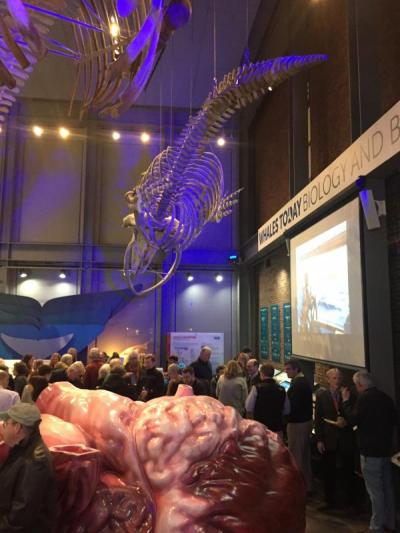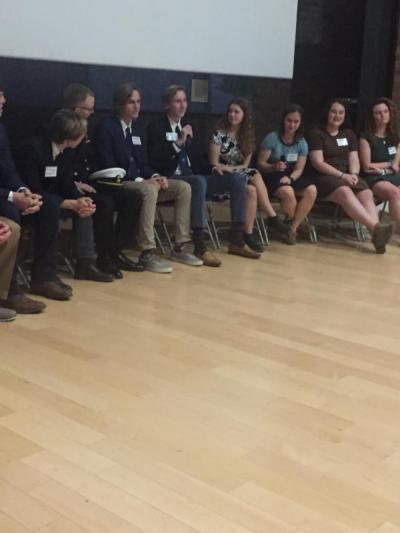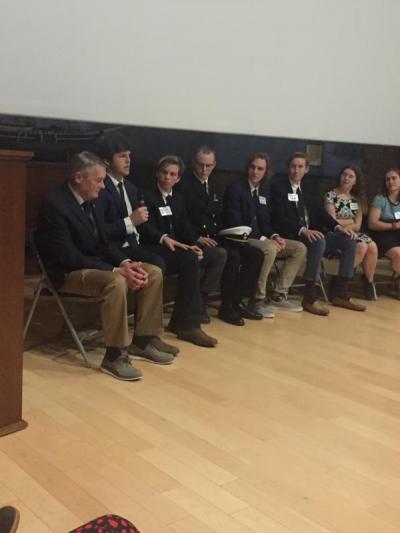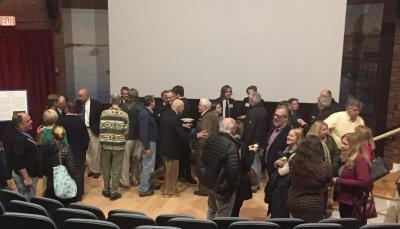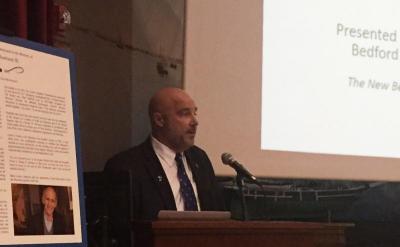Tabor sailors tell trials, triumphs of Tabor Boy
NEW BEDFORD — In a lecture at the New Bedford Whaling Museum on Feb. 27, the crew of the Tabor Boy for her inaugural Marion to Bermuda race described both the beauty of a voyage that one crew member described as “star hopping our way to paradise,” and all of the thrilling parts of the trip, from kitchen fires, to almost losing a raft and drone.
The “star hopping,” comment by Greg Nourjian refers to the fact that the 23-member crew, mostly made up of Tabor students and recent graduates, made the voyage entirely by celestial navigation.
A 30 minute film by 2017 Tabor Academy graduate and budding filmmaker Jack Gordon also played a prominent part in the lecture, showing the audience a bit of what it was like to be on the voyage. “Celestial,” has now been submitted to national and international film festivals (view a trailer here).
Tabor Academy offers celestial navigation, or cel nav, as its students affectionately call it, as a full year course. The ancient art uses the sun to navigate in the daytime and the the stars, moon and horizon line at dusk to draw multiple “lines of position” on star charts. When those lines intersect, it creates a “fix” that shows where the vessel is.
The film showed how students were able to improve at that navigation over the course of the trip.
On the second night of the trip, students and the ship’s captain James Geil were able to calculate its position perfectly. “In class we hadn’t been able to get that fix,” one crew member commented in the film.
By the end of the trip, students were able to take 15 sights on celestial bodies in 20 minutes.
The film also captured the emotional moments and human connections among the crew, including hugs from the captain at the finish line, and one crew member leaning over to say “hi!” into the microphone. The Tabor Boy has also been invited to participate in the Newport to Bermuda race.
Asked how he was able to get both the vessel and crew ready for the 650 mile race, Geil responded that it was “drills and drills and drills,” adding that his crew knew “how to sail a schooner, but there’s a lot more than that.” Including damage control drills with the Coast Guard and drills with the Harbormaster.
“We jumped in without life jackets to see how much you need them,” said Chip Connard, the ship’s Executive Officer.
For some students it was an incredible experience. Deckhand Emma Holloway called the trip, “probably most amazing thing I’ve done in my life.” She described moments of the night watch where she was out on deck with “a million stars, and nothing else.”
But that didn’t mean there weren’t some adventures and mishaps.
One night, the crew almost lost the boat’s inflatable raft, and a crew member had to jump into it several times in the pitch black. Gordon also came perilously close to letting his drone run out of batteries, with Christian Vander Mel having to snatch it out of the air, since it was impossible to land on the ship.
At least a few students, including Gordon and his fellow crewmate Blake Roberts, suffered from seasickness.
At one point a crewmate came down to tell Roberts that he was going to miss the sunset. “I don’t care about the sunset,” he responded, adding that “I’m pretty sure I lost 10 pounds!”
Provisioning three meals a day for 23 people was a bit of an adventure, with Vander Mel admitting that his first meal was two hours late and burnt. He also said that he had a literal trial by fire, with a blaze that broke out in his kitchen.
“I’m glad we were on a starboard tack the whole way down,” he said, “because without a starboard tack I couldn’t open the oven.”
But the dangerous moments teach students a lot. Geil said that a lot of the program was putting responsibility on students’ shoulders, teaching them to be honest, reliable, and to make good decisions about things.
Ultimately, the captain can see that his students just “want to be trusted.”
After 30 years with the program and sailing with many crews just students, Geil called that decision “one of the most valuable if not the most valuable aspect of the program,” a remark that earned him a standing ovation and wrapped up the program.



